| » Home » DIASPORA NEWS |
| Kenya's anti-gay laws lead to harassment, LGBT persons say, want change |
| PHOTO: | Gay rights activist Joji Baro speaks during a forum on the Film Bill in October 2016. /COURTESY |
|
| |
|
|
By:
LYDIA MATATA
|
| Posted:
Dec,15-2016 11:06:31
|
|
| |
|
Activist and musician Joji Baro (George Barasa) hides his shoulder-length hair under a grey mavin. The 25 year-old likes to put make-up on his delicate face and walk with a bit of a strut.
But Joji Baro chose boyish clothes today and admits that he cannot fully express himself when he is around Kenyans.
"What I fear most is that I am very cute. When I wear make-up, I fear how the public will react when they see that I am too beautiful to be a man," he explains.
He identifies as a gender non-conformist, saying he answers to either he or she, and adding that he has had several run-ins with the public because of this. His fear makes him overly cautious when navigating public spaces.
LGBT rights groups say sexual minorities often come into conflict with the public, including law enforcers, who use Kenya's anti--homosexuality and petty offences laws to harass members of the gay community in both public and private spaces.
Earlier this year, a case was filed by rights groups and activists, including an Anglican priest, to challenge the government to protect LGBT people from harassment and violence.
Laws allowing moral policing
Same-sex acts are outlawed under Kenya's penal code which provides a sentence of up to 14 years for what the law terms as "indecent" or 'unnatural' acts.
In 2014, National Assembly Majority leader Aden Duale tabled a list of 595 cases which had been reported and prosecuted under the penal code since 2010.
A 2013 report by the Pew Research Center states that 90 per cent Kenyans believe homosexuality should not be accepted in society.
Reverend Mark Otieno, who is part of the case to repeal sections of the penal code criminalising same sex acts, says he has witnessed several incidents of violence against gay people because of these laws.
"I have witnessed people who have been raped so that their sexual orientation can be corrected. I also counsel people who have been chased away from communities for showing affection to the members of the same gender, he says.
"At one point I had to handle a case of a man who was living with a fellow man whose house was set ablaze by his neighbours. Police arrived before they were lynched but they were still arrested for committing an unnatural act."
Jackson Otieno, programmes officer at the Gay and Lesbian Coalition of Kenya (GALCK), says the laws lead to moral policing and harassment of sexual minorities and violations of human rights.
"What these laws do is give anybody justification for moral policing. Most of the time ignorant people are arrested using these laws. It leads to profiling, where on some nights, arrests are made in clubs and other spots that LGBT people frequent," says Otieno.
He adds that gay people live in fear, which leads to exploitation from both members of the police and the public through extortion.
"Of course a smart prosecutor will not take you to court on a charge of homosexuality. But people go through the process of being put in the cell and being bailed out due to a combination of fear and an ignorance of the law., he says.
|
|
Source:
|
|
|
|
|
|
|
|
|
|
|
| |
| |
|
|
|
|


.jpg)




